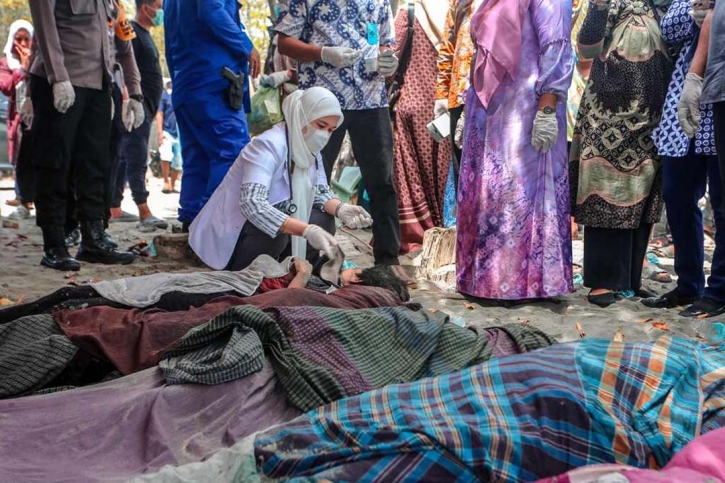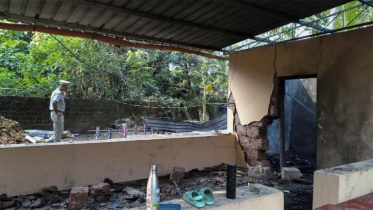
A medical official examines bodies of Rohingya refugees at a beach in Indonesia’s Aceh Province. AFP
Human traffickers left dozens of Rohingya refugees, including children, stranded on a shoreline in westernmost Indonesia on Thursday, while six dead bodies were found nearby, local officials said.
Members of the persecuted minority risk their lives each year on long and dangerous sea journeys, often crowding into rickety boats in the hopes of reaching Malaysia or Indonesia.
The refugees were abandoned before dawn on Thursday around 100 metres off a beach in Aceh Province, Saiful Anwar, a village official in East Aceh, told AFP.
The group included 46 women, 37 men and seven children, he said, while locals found two bodies on the shore and four floating in the sea.
"According to information from residents, these people were stranded at around 4 am (2100 GMT). It seems like there was a boat that brought them," Saiful said.
Eight sick refugees were taken for medical treatment, he said.
East Aceh acting district head Amrullah M. Ridha told reporters the refugees would be kept in tents on the beach until authorities sheltered them.
The UN refugee agency (UNHCR) said it knew about the arrivals but could offer no further information.
Acting Aceh Governor Safrizal, who goes by one name, told reporters "human trafficking mafia activity" was to blame for the latest arrivals.
It is the third group of arrivals in western Indonesia this month, with more than 150 refugees landing in Aceh and another 140 arriving in North Sumatra province.
According to UNHCR, 2,500 Rohingya arrived by boat in Aceh between January 2023 and March 2024, as many as had arrived in Indonesia in the previous eight years.
The mostly Muslim ethnic group faces persecution in Myanmar, and many have fled military crackdowns, seeking shelter in sprawling refugee camps in neighbouring Bangladesh.
Every year, thousands of Rohingya attempt the perilous 4,000-kilometre journey (2,500 miles) from Bangladesh to Malaysia, fuelling a multi-million-dollar human-smuggling operation that often involves stopovers in Indonesia.
Indonesia is not a signatory to the UN refugee convention and says it cannot be compelled to take in the refugees, calling instead on neighbouring countries to share the burden.
Many Acehnese, who themselves have memories of decades of bloody conflict, are sympathetic to the plight of their fellow Muslims, but others say their patience has been tested by the annual arrivals.





































